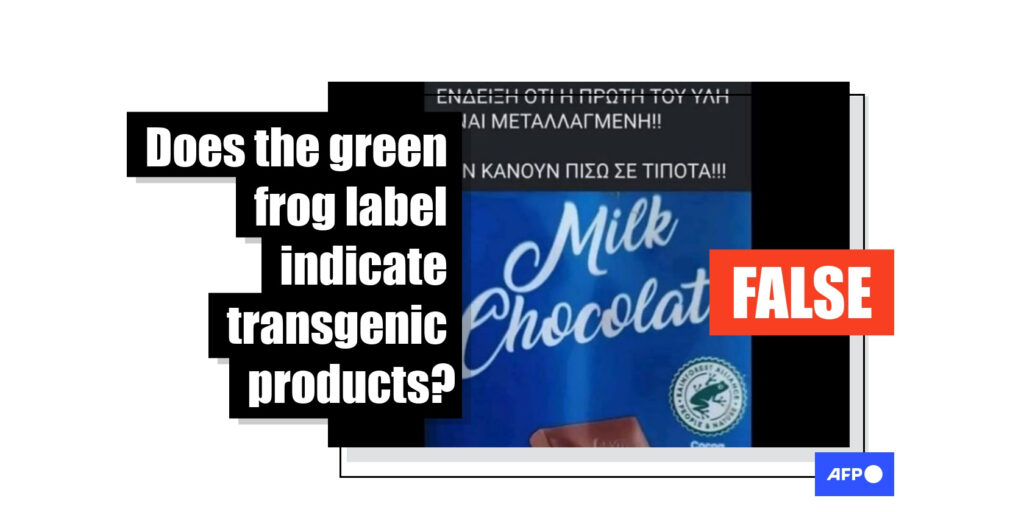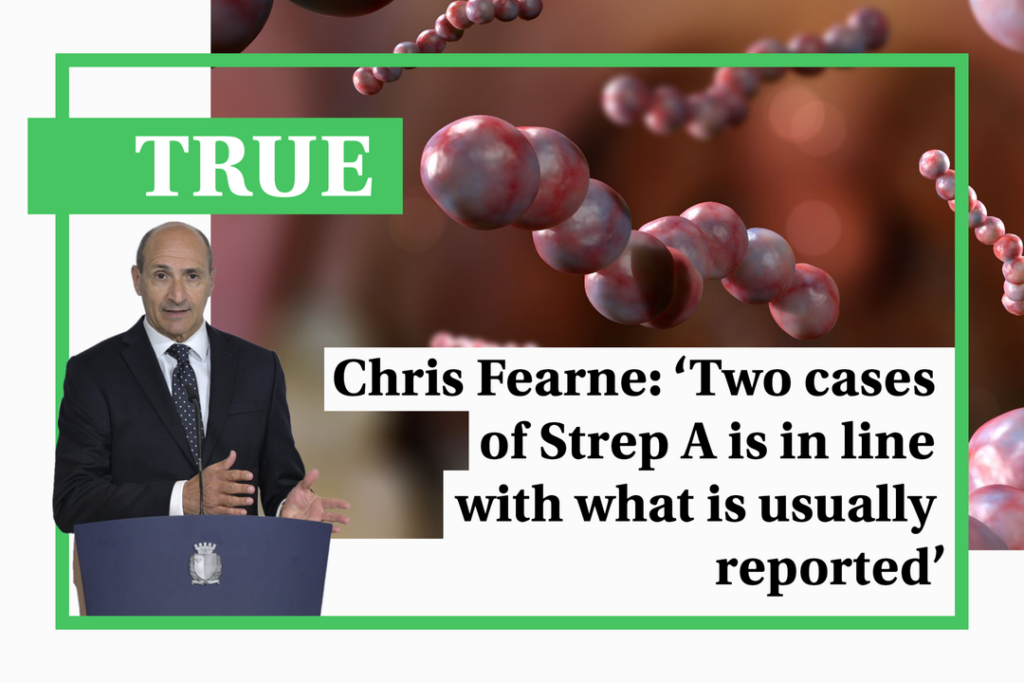A circular seal showing a green frog under the words “Rainforest Alliance” indicates that a food product comes from sources that have been certified as meeting sustainable agricultural and supply chain standards. The symbol does not indicate that a product’s raw materials are “transgenic” — i.e. genetically altered — as social media posts shared hundreds of times In January 2023 falsely claimed. Rather, the Rainforest Alliance told AFP that the products they certify do not contain any genetically modified organisms (GMOs). In addition, EU regulations require that GMO are clearly identified on food labels.
“Spread the word! Beware the products that have the green frog on them. It is a proof that its raw material is transgenic!”, claims a Greek-language Facebook post published on January 20, 2023 and shared hundreds of times since.
Transgenic refers to an animal or plant that contains genes added from another organism.
The post includes an image of a chocolate bar with a seal showing a green frog and the text: “Rainforest Alliance-People & Nature”.
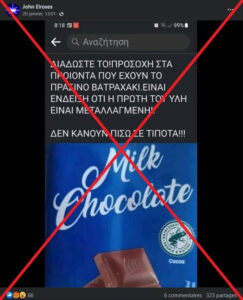
Similar posts were shared in Greek on Facebook ( here ) and on TikTok (here ).
To verify the claim, we started by searching for the words seen on the frog label: “Rainforest Alliance – Nature & People”. We found that the seal belongs to the Rainforest Alliance, an international certification body for sustainably developed products.
We also confirmed that the chocolate bar seen in the photo is a brand distributed by the German supermarket chain Lidl, as seen in the photo below of the same bar we found at a supermarket in Athens:
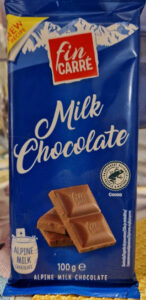
The Rainforest Alliance explains on its website that the seal is applied to products “produced using methods that support the three pillars of sustainability: social, economic, and environmental”.
A document published on the NGO’s website, and last updated in May 2022, specifies the requirements for the use of this seal and explains that it can be displayed by “farm enterprises that meet the relevant certification standard” and “supply chain actors that source, handle and/or sell ingredients/crops from these certified farms, in compliance with our requirements for certification”.
A spokesperson for Rainforest Alliance in Europe told AFP via email on January 24, 2023 that crops that meet the certification “may not be genetically modified”. She pointed to the 2020 Sustainable Agriculture Standard, a document which, on page 47, states that it is a “core requirement” that “the certified crop is not genetically modified (GMO)”.
“As part of the core requirements in our Sustainable Agriculture Standard, Rainforest Alliance Certified crops are not allowed to be genetically modified (GMO),” the spokesperson wrote. “Certification is a voluntary tool that can help to improve sustainability performance.”
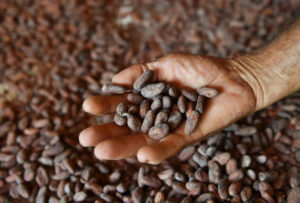
GMOs must be clearly labelled
In a telephone interview with AFP on January 30, Eleni Alevritou, vice president of the Union of Consumers – Quality of Life (EKPIZO), confirmed that the Rainforest Alliance label does not indicate that the raw materials of a product are “transgenic”.
“It is a label that certifies that the raw materials of the product respect certain environmental, economic and social standards”.
Alevritou also explained that these labels do not signify the product contains GMOs, “but on the contrary, indicate a certain quality of the product”, similar to the Fairtrade label.
“The advantage that such a label gives to the product is commercial, as a consumer may prefer a product with verified commercial, ecological and social standards”, she added.
If the product shown in the images shared on Facebook were to contain a GMO material, “this should be clearly indicated, as required by European laws”.
In Greece, GMOs must be clearly labelled on the food product’s packaging, according to the European law n°1830/2003. This regulation, available in Greek here and in English here, explains on page 3 that, “for products consisting of or containing GMOs, operators shall ensure that: (a) for pre-packaged products consisting of, or containing GMOs, the words ‘This product contains genetically modified organisms’ or ‘This product contains genetically modified [name of organism(s)]’ appear on a label; (b) for non-pre-packaged products offered to the final consumer the words ‘This product contains genetically modified organisms’ or ‘This product contains genetically modified [name of organism(s)]’ shall appear on, or in connection with, the display of the product”.
The same regulation is available on the website of Greece’s Ministry of Rural Development and Food here.
In the case of the chocolate bar seen in the social media posts, we found no mention of a GMO or transgenic raw material on the package.
AFP has verified other misleading claims about food labels here.
